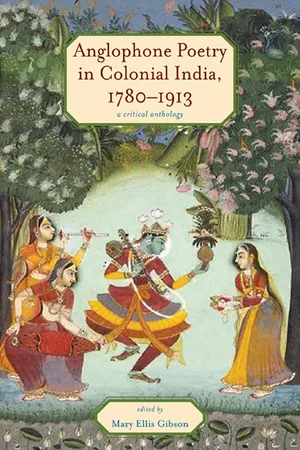
Anglophone Poetry in Colonial India, 1780–1913
A Critical Anthology
Mary Ellis Gibson, Mary Ellis Gibson
- 360 pages
- English
- ePUB (adapté aux mobiles)
- Disponible sur iOS et Android
Anglophone Poetry in Colonial India, 1780–1913
A Critical Anthology
Mary Ellis Gibson, Mary Ellis Gibson
À propos de ce livre
Anglophone Poetry in Colonial India, 1780–1913: A Critical Anthology makes accessible for the first time the entire range of poems written in English on the subcontinent from their beginnings in 1780 to the watershed moment in 1913 when Rabindranath Tagore won the Nobel Prize in Literature.Mary Ellis Gibson establishes accurate texts for such well-known poets as Toru Dutt and the early nineteenth-century poet Kasiprasad Ghosh. The anthology brings together poets who were in fact colleagues, competitors, and influences on each other. The historical scope of the anthology, beginning with the famous Orientalist Sir William Jones and the anonymous "Anna Maria" and ending with Indian poets publishing in fin-de-siècle London, will enable teachers and students to understand what brought Kipling early fame and why at the same time Tagore's Gitanjali became a global phenomenon. Anglophone Poetry in Colonial India, 1780–1913 puts all parties to the poetic conversation back together and makes their work accessible to American audiences.With accurate and reliable texts, detailed notes on vocabulary, historical and cultural references, and biographical introductions to more than thirty poets, this collection significantly reshapes the understanding of English language literary culture in India. It allows scholars to experience the diversity of poetic forms created in this period and to understand the complex religious, cultural, political, and gendered divides that shaped them.
Foire aux questions
Informations
APPENDIX
Comic and Satiric Poets of the Long Nineteenth Century


from The Grand Master
Table des matières
- Cover
- Title
- Copyright
- Dedication
- Contents
- Acknowledgments
- A Note on Names
- Abbreviations
- Introduction
- Sir William Jones
- Sir John Horsford
- Anna Maria
- Lady Maria Nugent
- John Leyden
- James Atkinson
- Reginald Heber
- George Anderson Vetch
- Horace Hayman Wilson
- John Lawson
- Thomas Medwin
- Emma Roberts
- James Ross Hutchinson
- Henry Meredith Parker
- David Lester Richardson
- Honoria Marshall Lawrence
- Kasiprasad Ghosh
- Henry Louis Vivian Derozio
- Henry Page
- Sir John William Kaye
- E.L.
- Michael Madhusudan Dutt
- Shoshee Chunder Dutt
- Govin Chunder Dutt and The Dutt Family Album
- Mary Seyers Carshore
- Sir Edwin Arnold
- Greece Chunder Dutt
- Mary Eliza Leslie
- Sir Alfred Comyn Lyall
- Aru Dutt
- Toru Dutt
- John Renton Denning
- Rabindranath Tagore
- Laurence Hope [Adela Cory Nicolson]
- Rudyard Kipling
- Manmohan Ghose
- Joseph Furtado
- Aurobindo Ghose
- Sarojini Naidu
- Appendix: Comic and Satiric Poets of the Long Nineteenth Century
- Index of Authors
- Index of Titles